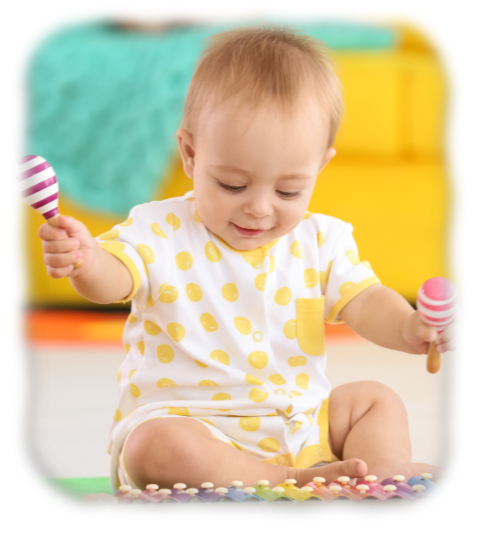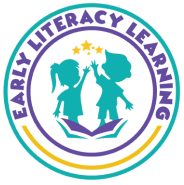The Baby & MUSIC!
Birth to 12 months

November 24, 2023
The new baby brain is listening to the all the sounds in their environment. At birth an infant has 86 billion brain cells. The cells control breathing, heartbeat and sucking while they are working hard to adapt to their new world. Other neurons are beginning to form neural connections at a fast pace of 1 million per second. The baby brain doubles in size in the first year and reaches 80% of its brain growth by age three.
One way to help a child build an outstanding brain is to introduce music into their life. Dr. Anita Collins, an educator, researcher and writer in the field of brain development and music learning, stated that, “Babies don’t understand language when they are born but they use their musical processing network to understand when a parent is speaking to them. The more variety on that speech and the more joy it includes gives babies a huge lexicon or dictionary of sounds to then start experimenting with language themselves. Just think of it as a varied diet for the ear, just like we encourage a varied diet for a baby’s body to grow. A variety of sounds make a baby's brain grow, literally!”
Music is important and impacts all 4 developmental domains. Here is a partial list of its benefits:
- physical: small & large muscle movement, coordination & balance
- cognitive & language: increase vocabulary, retain words, auditory discrimination & auditory sequencing of sounds/words
- social/emotional: changes moods-soothing or active creates bond of togetherness & trust
The physical development of a human baby is unique., it’s a top-down growth. In the first months a baby’s body is gaining strength in its head and neck. By the third month the arms and hands are more active. Many more months will pass before the baby’s lower torso is able to support its own body weight. When that happens, watch out! Mobility is right around the corner!
Physical skills, attention span and mood are considered when choosing the first musical activities. As the baby’s physical strength increases, their capabilities to actively participate with music grows. Shaking hands, grasping objects, kicking feet are their early responses. When first introducing music it’s important to present it in short intervals of time. Babies can become overly excited by the sounds. Some infants may give a “time to stop” signal, by being fussy or starting to cry. Honor their wishes by accepting their communication. Try music time later-on, or even the next day. Being together, learning about each other through positive interactions is part of the musical journey.
A study of children 5 months to two years old showed their preference for music. “Researchers have discovered that infants respond to the rhythm and tempo of music and find it more engaging than speech.”, reported Science Daily. In those early months, really all through their young life, listening to songs or even made-up songs sung by their parents is important for a baby. Singing to an audience of one, will always be welcomed. Just know that according to the precious baby (the listener) -- every performance is deserving of a Grammy!
– Music from one heart to another heart brings only pure joy. –
Holding the baby, providing direct eye contact and loving facial expressions during singing is all part of the warm exchange. Babies love and need to be the center of a parent’s attention. “Long before babies acquire spoken language,touch is a crucial channel of communication between caregivers and babies,” said Andrew Meltzoff, UW psychology professor and co-director of I-LABS., the study’s primary author. “Now we have the tools to see how the baby’s body is represented in the baby’s brain. This allows us to catch the first glimpse of a primitive sense of self that provides a building block for social learning.”
A baby has one huge job---LEARN! Its brain is charged up to learn. First, it’s about how to get its bodily needs met (food, rest etc.). Soon it’s all about their new family, body movements and surroundings. As the infant becomes older, their want for experiences which will expand their brain is fore front in their mind The learning brain desires to gain more skills and knowledge-”feed me”-so says the brain. Parents are the special people, who are available to surround the baby with love and provide opportunities for learning about musical connections.
Well, just what are some of those musical connections? Great question! --That’s what is coming up. I’ll be sharing specific Music Time ideas and activities to use with your baby!
“I would teach children music, physics and philosophy; but most importantly music, for the patterns in music and all the arts are the keys to learning.”
